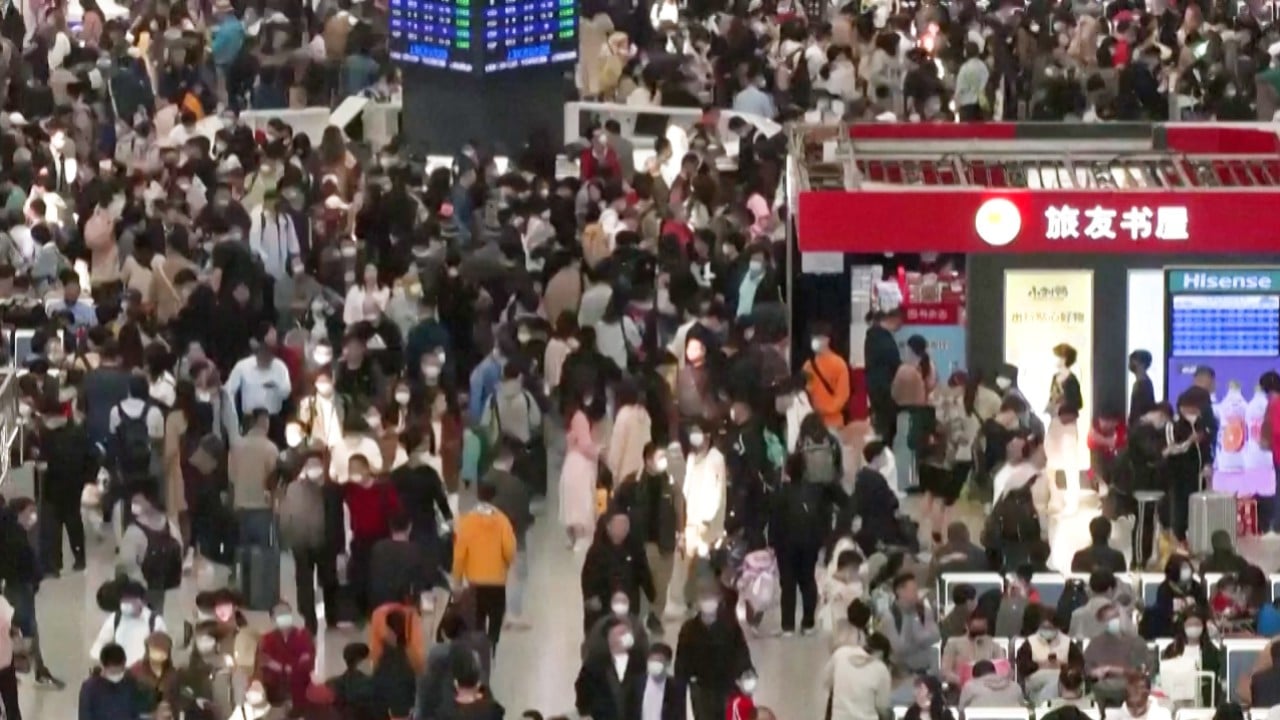
Trip.com needs a spark from China’s first post-pandemic ‘golden week’ to recharge US$16 billion stock rally
- Shares of Shanghai-based Trip.com have been flattish lately despite having added US$16 billion in market value since November
- Initial data showed travel bookings, searches for hotels and flights have surpassed levels seen in 2019 before the Covid-19 outbreak
The first post-pandemic “golden week” could not have come soon enough to test the strength of China’s economic rebound. After a mixed bag of economic data, investors will be banking on a spending binge to light up the struggling equity market.
The early signs are encouraging. Air ticket bookings through Wednesday were 37 per cent above the level during the same May Day holiday in 2019, before the Covid-19 outbreak, according to Shenwan Hongyuan, a Shanghai-based brokerage. The average ticket price rose 41 per cent to 1,137 yuan (U$164.4).
Data generated by Trip.com, China’s biggest onshore travel operator, also painted a rosy scenario. First-day bookings in Zibo city in eastern Shandong province, for example, grew 40-fold from a year earlier, while hotel bookings surged 800 per cent versus 2019.
That could give Trip.com, one of the market’s top picks in China’s recovery play, a much-needed spark after recent doubts about the economic outlook. Despite adding 50 per cent or US$16 billion in combined market value in Hong Kong and New York since November, the stock has gone stale in the past month.
“The good reading from travel bookings suggests the recovery in consumption has more legs, at least for this quarter,” said Chris Liu, a portfolio manager in Hong Kong at Invesco. “The market focus will gradually shift to economic data and corporate earnings as China’s growth has returned to pre-pandemic trajectory.”
Beijing businesses tout deals and events to tap golden-week tourism boom
That makes its first-quarter earnings report on May 15 a key event to watch. The Shanghai-based group is forecast to make 818.6 million yuan of profit based on global accounting standards, according to Bloomberg data. It lost 989 million yuan a year earlier.
Trip.com posted a 1.4 billion yuan profit in 2022 to end two years of losses. The company survived by cutting operating costs before China lifted a ban on international travel and fuelled demand for its services.
“The outbound travel business has higher profit margins and that will further strengthen the company’s profitability,” said Zeng Guang, an analyst at Guosen Securities in Shenzhen.
China manufacturing PMI hits lowest level since post-Covid reopening
Even so, onshore investors have since grown wary of China’s economic recovery momentum. Clients surveyed by Goldman Sachs last month showed onshore money managers were sceptical about the outlook. Those in Europe and Hong Kong surveyed by Bank of America were frustrated by the lagging Chinese stock returns.
“It is still too early to put an ‘all-out’ [buying] alert as recent economic reports indicated a recovery [in progress] stage,” said Kelvin Wong, an analyst at Oanda. “The golden week holiday will provide the latest gauge on consumer optimism and spending power.”
Three years of rigid zero-Covid policy devastated China’s tourism industry, upending businesses from airline operators to Macau’s casino concessionaires. Trip.com lost half of its market value in Hong Kong at one point, while its American depositary shares sank 27 per cent.
Trip.com’s latest data showed smaller mainland cities have become the most popular destinations for domestic travellers. Travel bookings to places like Zibo in Shandong, and Yining in northwestern Xinjiang province, rose 157 per cent over the same holiday season in 2019.
Local authorities in Zibo have had to intervene to cap the increase in hotel rates at 50 per cent for the holiday that runs through Wednesday to stem profiteering, according to local media reports.
Searches for overseas hotels have recovered to about 70 per cent of pre-pandemic levels, with South Korea, Japan and Southeast Asian nations among the most sought after, according to Trip.com data.
Investors can be unpredictable, Wang Qi, CEO of MegaTrust Investment in Hong Kong, said in a report on April 29. He noted that Lunar New Year consumption was relatively muted, and Chinese stocks have retreated since the GDP report last month.
“I am not sure how the market would react to any consumption strength post the holidays,” Wang wrote. “A broad-based recovery is needed for a meaningful impact on the economy.”




